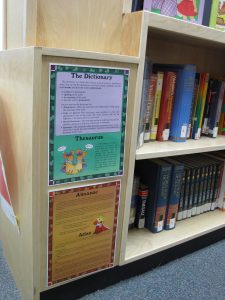 I agree with my classmates that the proliferation of information, including online encyclopedias such as Wikipedia makes teaching information literacy skills that much more important, as teachers and teacher-librarians will not always be at hand to help people vet resources throughout the lifespan. Students need to acquire sufficient critical thinking skills to evaluate resources independently. Until they possess these cognitive abilities, I think younger students should have adult supervision while accessing the internet for research purposes, and perhaps should be give specific web sites for search purposes.
I agree with my classmates that the proliferation of information, including online encyclopedias such as Wikipedia makes teaching information literacy skills that much more important, as teachers and teacher-librarians will not always be at hand to help people vet resources throughout the lifespan. Students need to acquire sufficient critical thinking skills to evaluate resources independently. Until they possess these cognitive abilities, I think younger students should have adult supervision while accessing the internet for research purposes, and perhaps should be give specific web sites for search purposes.
Wikipedia is a controversial encyclopedic reference source. Kids love it, teachers not so much. But since Wikipedia is an established part of the learning landscape for most students why not put it to good use? One way, as other classmates have mentioned, is to teach students how to use it wisely, for example by using is as part of a learning activity that involves comparing information found there to information found in so-called authoritative encyclopaedias such as World Book. Further, if we want students to avoid sources like Wikipedia we will probably need to guide them to other sources and make those substitute sources easy to access. In teaching as in parenting, sometimes we need to create a diversion or offer guidance in the form of more suitable options.
And then there is the problem, much discussed and debated, of encyclopedias becoming dated soon after purchase. What I wonder about – and this may sound heretical in a course such as this one – is whether the date of the material (e.g. encyclopaedias) is really that important (as long as it is not truly ancient!) to the inquiry process, or whether it is more important that students know how to use the encyclopedia as a research tool. Looking at this another way: Is the research process, especially for younger students, about acquiring and remembering specific facts, or about acquiring information literacy skills and valuing the concept of information literacy itself? Facts are a shallow form of knowledge, easily forgotten, but information literacy is deeper learning that is transferrable from grade to grade and subject to subject, and is built upon as students mature.
So which matter most, product or process? Sure, available research material should be relevant and appealing, and some information on some topics in some fields (technology, medicine, politics etc.) does become outdated more rapidly, necessitating access to reliable online sources for those topics. At university level availability of the most current material it is increasingly important, but a university will at least have the budget to support the kind of academic research materials its population needs. But at the elementary school level, hand-wringing over dates of encyclopedias is a waste of energy.
If the choice is between spending money on a new set of encyclopedias or spending money on education staff to teach research skills, I’d choose the latter any day.
